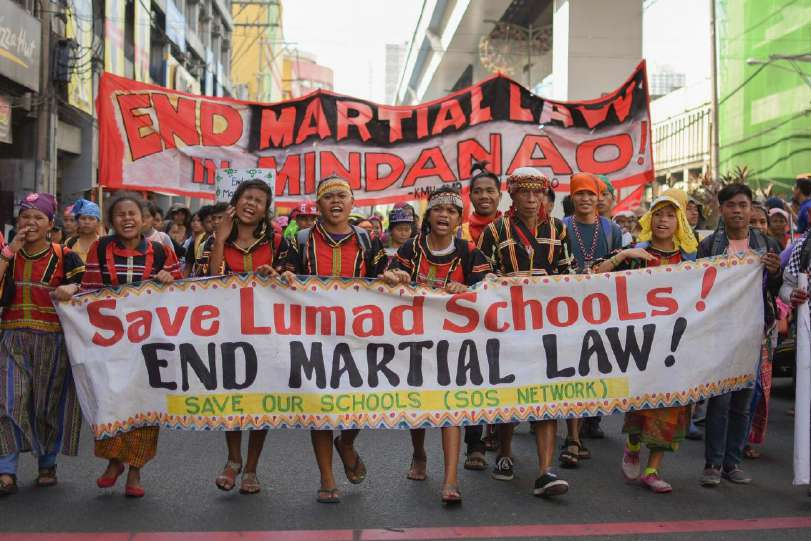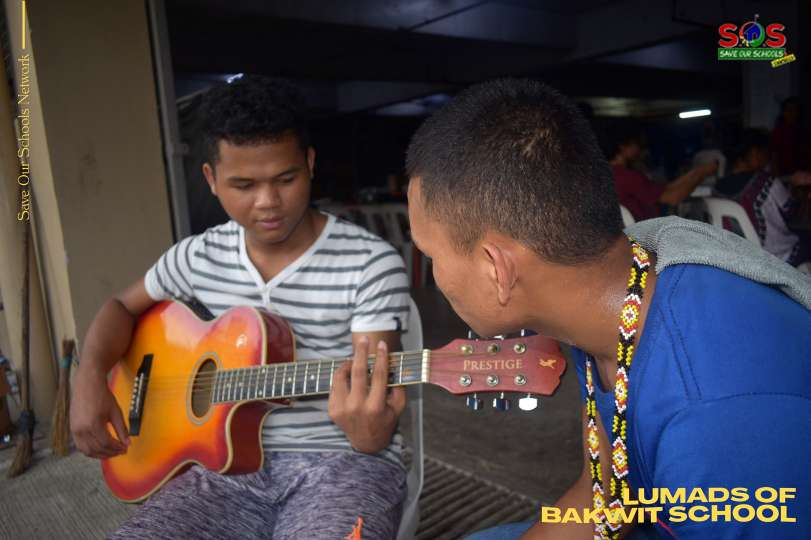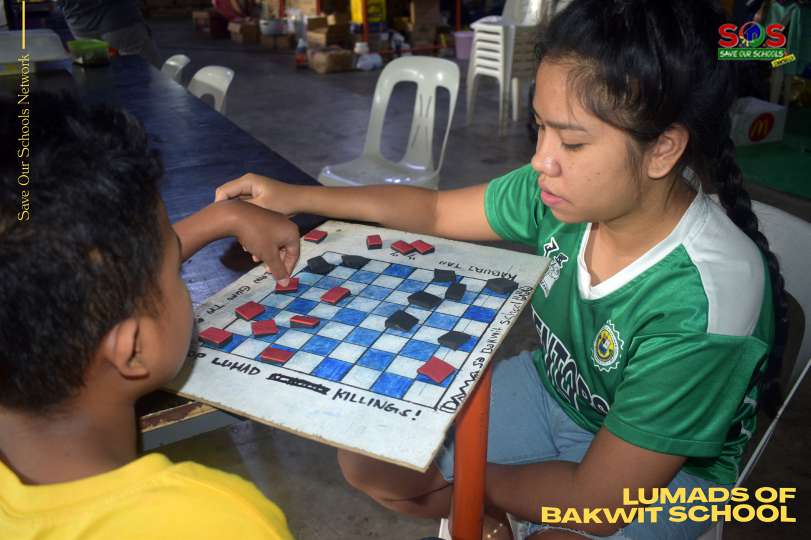The Bakwit School is the fruition of decades-long struggle by the Lumad people in Mindanao, Philippines. Since they only get a mouse’s share of state services, these indigenous peoples (IP) have paved the way for alternative practices that cater to their needs while improving their political organisation, economic welfare, and cultural life—thus contributing to the realisation of their own vision of development.
| Authors | Save Our Schools Network; UP CIDS AltDev |
|---|---|
| Topics | Education |
| Case Report | Volume 1: "Resilience in the Face of COVID-19" |
| Number of participants | 700 |
Brief description
The Bakwit School is the fruition of decades-long struggle by the Lumad people in Mindanao, Philippines. Since they only get a mouse’s share of state services, these indigenous peoples (IP) have paved the way for alternative practices that cater to their needs while improving their political organisation, economic welfare, and cultural life—thus contributing to the realisation of their own vision of development. The Lumads (formerly an exonym but now self-ascription for many communities), which comprises of eighteen non-Muslim ethnic groups in Mindanao, have built clinics and schools to serve their communities in lieu of distant government institutions (Alamon, 2017). Earlier, only one out of ten Lumad children knew how to read, write, and count (Sy, 2020). To combat the high incidence of illiteracy, religious groups, human rights organisations and IP advocates built community schools for Lumad people of all ages. Starting as literacy and numeracy programmes, many Lumad communities developed them further and began to establish secondary and tertiary learning institutions by the early 2000s (Alamon, 2017; Sy, 2020).
The Lumad schools also serve as political centres for many communities where indigenous leaders, parents, teachers and youth from across tribes meet to plan campaigns and launch protests against encroachment—mostly by mostly foreign corporations—in the Lumad ancestral land. Because of this, many of the Lumad schools have become targets of state violence (Belisario, 2019). The Save Our Schools Network (SOS) has documented these attacks, which occur as harassment, forced displacement, and militarisation. There have been over 1,000 such cases of state violence documented by SOS across Mindanao. To live and fight another day, many Lumad communities engage in what Filipinos call bakwit—a popular term for "evacuate"—to find sanctuary elsewhere.
To sustain the Lumad youth’s education, parents, teachers and supporters have created a temporary mobile school called the Bakwit School. In continuing the school students’ education while also keeping their political activism alive, the Bakwit School moves from one site to another to facilitate the staging of their protests as well as to ensure the security of participants (SOS, 2019b). More than 3,000 Lumad students—disenfranchised by the Duterte administration’s martial law in Mindanao—study in sanctuaries in Metro Manila and other capital cities to expose the situation of alternative tribal schools in Mindanao (Nolasco & La Vina, 2021).
Collaborating with SOS allows for churches, seminaries, universities and colleges to open their doors to the transient Bakwit School (SOS, 2019a, 15). From 2017 to 2018, and from April 2019 until today, around 700 Lumad students, teachers and parents from all over Mindanao have travelled to Manila to seek justice for human rights violations in the form of attacks against schools, communities, ancestral land, and resources (Belisario, 2019). Evacuation centres in Davao City, Cebu, and Surigao del Sur also house Bakwit Schools to allow the Lumad to continue their studies.
Process that led to the community being resilient (Pre-covid)
Despite a lack of resources, Bakwit Schools hold classes with the help of allied institutions and volunteers. Given that only a handful of Lumad teachers were able to leave their communities in Mindanao, volunteers are enlisted to teach specific subjects which the students need to take in order to move up to the succeeding level. The volunteers need not be licensed teachers—many of them are undergraduate and graduate students from different disciplines as well as homemakers, people from religious groups, professionals, and activists. Teachers undergo educational discussions that relate the Lumads’ current situation, culture, and, ultimately, their historic struggle towards emancipation (SOS, 2019a, 15). Classroom materials were barely salvaged from attacked schools, so teachers and students rely on donations by other volunteers and external institutions.
To ensure the maximisation of resources, students, teachers and staff are grouped into committees assigned to household duties such as cooking, cleaning, and laundry. Some of them work on creative tasks, such as with visual arts and publicity committees where members craft placards for protests and other artistic materials that may be used in the activities of the school.
Bakwit Schools across the Philippines have led successful mobilisations over the years, including the National/International Children’s Day protest every 14th of November. While an emphasis on rescinding martial rule in Mindanao was made during the 2018 protest, the National Children’s Day protest in 2019 also called for climate and environmental justice—underscoring the fact that the youth of this generation shall be facing the ecological impacts of climate change years later. Students and teachers of Bakwit Schools also join public demonstrations staged by peasants, workers, women and LGBTQ+, and the urban poor. In every protest, students carry their most fundamental call "Save our schools! Stop Lumad killings!" to urge the government to withdraw military presence in their communities. This gives them hope that they may return to their yutang kabilin (ancestral land).
On the 29th of March 2019 at the University of the Philippines Integrated School in Quezon City, the Bakwit School’s first milestone was celebrated. With allies from the church, academia, and civil society organisations, a moving up ceremony was held to recognise the students’ one year of struggle for education in the school. It also saw the first batch of students enter Grade 12 in the Bakwit School.
How resilience that was established has helped during the pandemic
In response to the pandemic, the Philippine government has, over time, imposed various permutations of community quarantines, forcing the country into a lockdown each time. The Lumads have been burdened by haphazard policies that limit their movements and disrupt their daily lives. It has been especially difficult for the communities that are being militarised and those who are in evacuation. Securing food and other basic necessities has become a challenge to many indigenous communities. Some Lumad refugees have also been forced to return to their (still) militarised ancestral land—land which they have temporarily left due to state violence.
Despite the hostility and violence of the state, students, teachers and staff of the Bakwit School in Metro Manila have been involved in activities amidst the pandemic to help Lumad students continue their education and continue propagating the political campaigns of Lumad communities and organisations. Given that the school year has ended and that volunteer teachers cannot enter the school premises of the Bakwit School, remedial classes on literacy and numeracy as well as intermediate reading comprehension are being conducted so that the students can enter the next school year all at the same level. Older students, mostly at the Senior High School level, are also assigned to assist younger learners in peer-to-peer storytelling and reading activities.
In order to secure basic necessities, SOS has also been organising donation drives to keep the Bakwit School afloat. The drives are meant for provisions of vegetables, fruits, rice, and other healthy foods for the evacuees. Toiletries, first aid, and medical kits have also been solicited. Since July 2020, the donation of materials like books and musical instruments are also being encouraged.
The lockdown has had a heavy toll on the emotional and psychological well-being of students. The environment of isolation and the constant barrage of disturbing news about their families and communities being harassed have posed bigl challenges for the mental health and welfare of many of the students. Different activities that cultivate skills and hobbies are being conducted not only to "distract" the children from emotionally taxing dangers outside the school but also to provide them a temporary comfort. These include intramural sports events, beadwork, fine arts-related activities, and music. Some students have suffered a more alarming deterioration of mental and emotional health. Their anxieties are mostly directed at the safety of their families and communities, the possibility of returning to their home, and the upcoming school year. To address this, psychosocial support from allied health and children’s welfare organisations have been conducted, equipping the children with psychosocial training to help themselves and their schoolmates.
On 17th of July 2021, SOS, along with its allied organisations and institutions, held the second historic moving up and graduation ceremony on ground. This was held at the Bantayog ng mga Bayani in Quezon City, a monument and museum complex that honours the country’s martyrs for freedom and democracy across the decades. The event was attended by progressive policymakers, volunteers throughout the years, educators, religious leaders, and media personalities. They all celebrated the triumph of the 30 students who graduated despite the closure of their schools and the pandemic.
Lessons learnt
The Lumad people have long been targets of state-sponsored attacks due to their organising and mobilisation against the entry of foreign corporations in their ancestral land. They are, in other words, defenders of the land and its environment. The Lumad schools give the indigenous youth a chance to contribute to the self-sufficiency of their communities. Due to the closure of the schools due to militarisation, the Bakwit School extends the learning environment to different sanctuaries, thus allowing the continuation of education.
The Lumad Bakwit School is a model of the resilience of community-established alternative education. Given that Lumad schools were founded and developed by communities, a mobile school such as the Bakwit School that extends the services provided by Lumad schools is possible through the continued unity of community members and its allies. It represents the continued struggle of indigenous communities for land rights and the role of education in empowering those who participate in this struggle.
This mobile school is one of the many alternatives practiced by grassroots communities and peoples’ organisations across Southeast Asia (Tadem et al., 2020). These alternatives pose a challenge to the current socio-economic, political, and cultural systems that shape societies across borders. Even during the pandemic, communities and organisations committed to alternatives have found ways to address the shortfall of elected governments’ response to the health crisis.
Despite the challenges posed by the lockdown, the Lumad schools in Mindanao and Bakwit Schools across the country are using various means to reach out and spread awareness regarding the experiences of indigenous communities in Mindanao. They hope that more people will choose to stand with the Lumad in protecting and fully reclaiming their ancestral land for the continuing survival of their communities and the next generation. Indeed, no amount of threat can break the spirit and determination of Lumad students in asserting their right to education which will help them to defend their yutang kabilin for generations to come.
External references
Alamon, Arnold. (2017). "Wars of Extinction: Discrimination and the Lumd Struggle in Mindanao." Iligan City: Rural Missionaries of the Philippines Northern Mindanao Sub-Region (RMP-NMR), Inc.
Belisario, Paul. (2019). "Lumad Schools: A Struggle for Land and Learning." In Repression and Impunity: Continuing Attacks on People’s Rights in the Philippines, edited by Jennifer del Rosario-Malonzo, 71-80. Quezon City: IBON International.
Nolasco, Meggie at Tony La Viña. (2021). "‘Lumad’ schools and the right to education." Philippine Daily Inquirer, Hunyo 5, 2021. https://opinion.inquirer.net/140876/lumad-schools-and-the-right-to-education
Tadem, E. C. et. al. (2020). "Reinforcing people-to-people solidarities towards a regionalism from below: Alternatives from Southeast Asia amid COVID-19". University of the Philippines Center for Integrative and Development Studies (UP CIDS) Program on Alternative Development.
Save Our Schools Network [SOS]. (2019a). "Intensifying the People’s Struggle amidst State Fascism." Pamphlet.
Save Our Schools Network [SOS]. (2019b). "Lumad Bakwit School." Pamphlet.
Sy, Jose Monfred. (2020). "Teaching ‘Pangiyak Ki!’ The Lumad School as a Struggle for Land, Life, and Liberation." In Towards a Peoples’ Alternative Regionalism: Cases of Alternative Practices in the Philippines (Vol. 1), edited by Eduardo Tadem et al., 107-124. Quezon City: University of the Philippines Center for Integrative and Development Studies.


